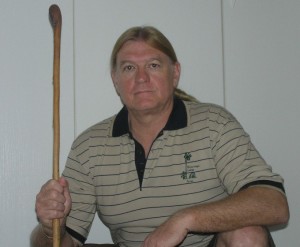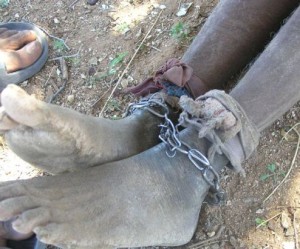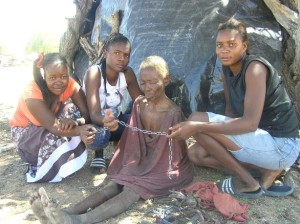 This eye-opening story from Berrie Holtzhausen of Dementia Namibia, (Namibia is a country in the southwestern region of Africa) had me reflecting on what it means to be a more “advanced nation” dealing with dementia.
This eye-opening story from Berrie Holtzhausen of Dementia Namibia, (Namibia is a country in the southwestern region of Africa) had me reflecting on what it means to be a more “advanced nation” dealing with dementia.
Berrie recounts stopping in a village to speak to the “headman” of the Ovahimba tribe. After presenting him with a gift, Berrie offers to help his sister who shows signs of dementia.  The “headman” tells him of the “trouble” they’re having with his sister and that “the church” sent people to pray for her and unchain her but soon his sister wandered away. When they found her two days later, she had nearly died. To prevent her from wandering, they chain her.
The “headman” tells him of the “trouble” they’re having with his sister and that “the church” sent people to pray for her and unchain her but soon his sister wandered away. When they found her two days later, she had nearly died. To prevent her from wandering, they chain her.
While reading Berrie’s story, my mind returns to the 1980s movie Amadeus, the story about Mozart as told by Salieri whose jealousy of his rival’s talent drove him to the insane asylum. Those dreadful asylum scenes still remain in my mind.
I wonder how many people were committed because we didn’t understand Alzheimer’s disease, Parkinson’s, Lewy body dementia, and other dementias.
After giving my father who lived with Alzheimer’s the best care I knew how, I realize that only a handful of decades ago we didn’t know enough to better care for loved ones who hallucinated, couldn’t express themselves clearly, and acted out inappropriately. I’ve heard caregivers and professionals recount their own stories of the mother who was tied up in a chair in the attic with the shades drawn or the “crazy uncle” locked in a backroom of the basement so no one would hear him scream.
This lack of knowing is all the more reason for Global Awareness for Dementia.
 The team from Dementia Namibia trains caregivers from different tribes so they can better identify and care for those living with dementia.
The team from Dementia Namibia trains caregivers from different tribes so they can better identify and care for those living with dementia.
By spring of this year, Berrie’s team cut the chains that bound Ndjinaa for 20 years, helped her get cleaned up, and now Ndjinaa serves as a friendly smiling grandma to the children of one Himba village.
Read more about this moving story at Alzheimer’s Disease International’s June 2013 newsletter (on pages 13 and 14), which will help anyone dealing with guilt to gain the confidence that we’re doing the best we can.









Hiya norrms here, i would just like to say a huge thank you to Brenda and Michael for supporting us in this venture with the New International Dementia awareness logo “The purple Angel” Its not meant to replace your logo, or mine !! its to use alongside. The world didn’t have a Logo for DEMENTIA AWARENESS until now and the reason why we call it The Dementia awareness Purple Angel” is because this way we encapsulate and embrace ALL TYPES of dementia and we are not leaving anybody out !! So please join us in sharing this logo across the world and showing people that this ANGEL will look after us ALL who are touched by this awful disease, Best wishes, Norrms J Mc Namara
Diagnosed with dementia 5 years ago at age 50 and still fighting it !!! xx
Hello Norrms. Thank YOU for being the co-creator of the Purple Angel so we have a symbol for Dementia Awareness. We’re all in this together.
Thanks so much for sharing. This is so heart breaking. I have tough time thinking what it may be like to be put me in a nursing home and I never want o reach that day. My god does the rest of the world have so much to learn. We need more people to help us get the word out to educate all these people.
Michael, I think of what you wrote…to imagine not knowing enough about this disease that your family chains you. We have come a long way but we have farther to go.
Thank YOU for sharing.
Hi Michael…I agree that the world does has a lot to learn yet and that there is a lot of aducation to be done..BUT in what you are seeing in ADI’s news letter and through the news letter of The care giver’s voice about our struggle in Africa is more then a lack of education or ignorance…it is about supertition, a way of living! When somebody is born with a brain deffect it is OK, but if a brain disorder or damage came later in life it is bewitching. a Paradigm shift is needed and to accomplished this is asking for an experience. By that I mean African communities , like the Himba people, need to experience a Dementia friendly village in their midst. In this way one can help the kids to experience that a dangerous witch is only a granny who has brain damage. That is our dream to build such a village among the Himba people, which can be the begining of the most practical awareness program in Africa. But Micheal we really need support [ financial ] to make this dream come true.
We in Deemntia Namibia are very grateful towards ADI and Brenda giving exposure to one of the biggest chalenges of Dementia awareness in the world. Berrie
Thank you, Berrie, for clarifying the difference between the need for learning how to care for one with dementia vs. the superstitions that prevent people from understanding the true nature of dementia as an illness afflicting people.
We did visit the Dementia House in October last year near Umaruru in Namibia where Berrie Holtzhausen and his team care for the people with Alzheimer’s and other dementias. It was an eye opening for us to see what they are doing!! The wonderful work that they are doing under this people is amazing. For the people it is a save place and really like their own home. The caregivers are also wonderful with this people. They need to be a round of applause for this work!! I know there is a great need, but they can only help these people if they have financial support. I really hope that organisation and business will support them financially in the program.
WOW, thanks for commenting. And yes, programs like this deserve funding to survive. Our world grows smaller and smaller–we’re not talking about people from another planet. No, these are our brothers and sisters. Thank you again, for sharing S. Krugel.
Hi Brenda I am really grateful to you responding on ADI’s article, contacted me and now for this. May you be blessed. The Himba people owes you and I am sure will be very grateful when I am visiting them again and will surely tell them about this. Berrie
Thank YOU for commenting Berrie. WOW, to think our world is “small” enough to touch someone on the other side of our globe who likely doesn’t even have access to a computer or smartphone. AMAZING. The Himba have gifted us with their experience to remind us of what remains to be done in how we care for people with dementia.
Hi Susan…thank you for your kind comments. Hope every thing is going well in South Africa. Berrie